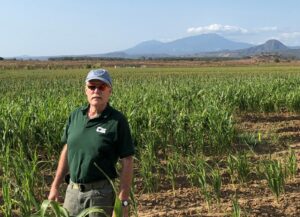Bryan Gentsch, executive vice president of the Texas Seed Trade Association (TSTA), and Denise Gentsch, legislative director of TSTA, discuss being business partners together and legislature that seed businesses should lobby for.

SW: What’s your favorite genre of music?
Denise Gentsch: I enjoy jazz especially from the 1930’s
Bryan Gentsch: I love classical, rock, and western swing, but jazz is my favorite.
SW: What’s something you’d never travel without?
DG:The right shoes for every possible activity.
BG: Internet connectivity is a necessity, unfortunately, so a tablet or laptop is always in my briefcase. If it’s for more than a few days, I’ll check a bag just to have a pocket knife with me.
SW: What’s the best thing to do on a day off?
DG: Being at our ranch with Bryan and our son, Tai.
BG: Spend quality time with Denise, our son Tai, and friends, enjoying God’s gifts in the big Texas outdoors.
SW: What’s it like working together at the Texas Seed Trade Association?
DG: Bryan and I are usually in-sync whether rolling out our annual membership production & research conference or meeting with legislators at the Capitol. Since I had worked with Bryan on state issues long before we began dating I knew that he would be a good business partner. Occasionally, one of us will forget to relay a detail to the other and it will come up in conversation with someone in TSTA. We just joke and say, “We don’t talk much.” Fortunately, our members know that our hearts and our desks are pretty close together.
BG: There may be people who could not, or would rather not, work with their spouse but I find it easy and fun. It helps when your spouse is bright and highly competent with a first-rate temperament. Denise and I worked together for a long time before we were an “item” and we knew our working relationship was solid. We each take care of the tasks we are better suited for, or enjoy more, with little overlap because our strengths and weaknesses are complimentary. Denise knows her way around government better than I ever will and I tag along to communicate the scientific validation for our positions.

SW: Are there any challenges?
DG: It is important to keep our 11-year-old’s life as consistent and balanced as possible. With meetings and travel we coordinate our schedules so that one of us can take care of him and support his activities. We are very lucky to be part of an organization whose members understand and support the family and particularly, our family.
BG: Being a relatively small staff we’re careful to take on what we can do well and in a timely manner. Prioritizing can be challenging because it seems there is so much more we could be doing that might prove beneficial for the industry.
SW: What’s something you’d both like people to know about the Texan seed industry?
DG: Our members care about the integrity of the industry and are willing to stand up for their values with or without support from others.
BG: The integrity, dedication, generosity, and resiliency of the professionals who make the Texas seed trade so vibrant is truly impressive. Our seed professionals have an overwhelming commitment to quality. The people we are privileged to work with would be successful anywhere doing anything.
SW: You’ve both spent a lot of time working with different legislatures, what do you think is the most important thing that seed businesses should be lobbying for?
DG: Owners, breeders, growers, sellers and everyone involved in seed operations are the best representatives to tell their own story and, therefore, give policymakers a human experience to connect to a policy decision. After touring a TSTA member’s operation a few years ago a state senator became interested in seed companies and their contributions to the state’s economy. Last session he stepped in as a champion of our industry to criticize increasing regulatory fees and their effect on individual business health and state competitiveness.
BG: That’s a tough one because there are so many. Advocating for scientifically reasonable regulation for new plant breeding techniques is crucial, goes beyond lobbying, and is global in scope and importance. International trade issues can make or break us, just ask our hybrid sorghum seed producers here in Texas about the effects of Chinese tariffs on grain sorghum. One of the things that never goes away is seed law regulation and it is past time we change the way state and federal seed law is enforced. Most seed law has not changed appreciably since the mid-1930s and we’ve effectively developed a self-regulating industry since then. There are better, and less expensive, ways to achieve the intent of seed quality standards and reducing the time and resources required for regulatory compliance would provide lasting benefits.













